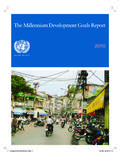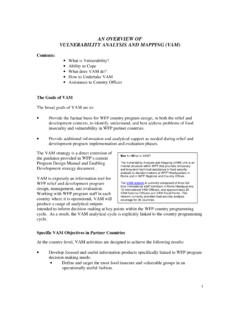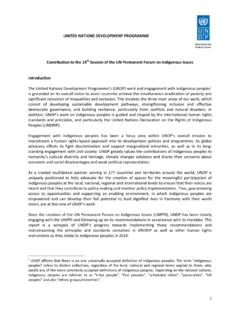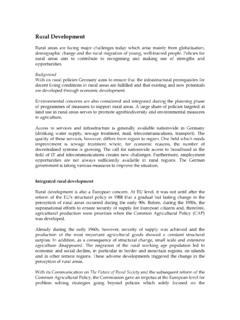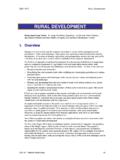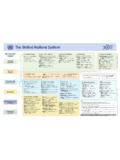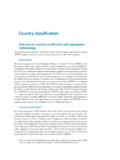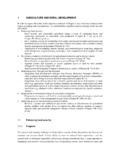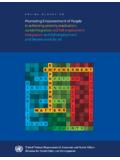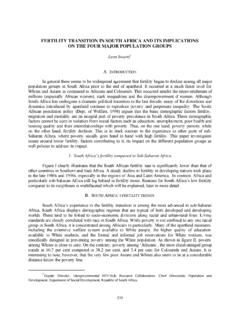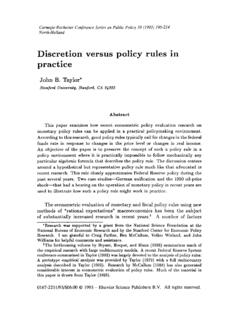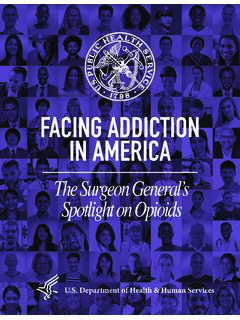Transcription of The Role of Media in Promoting Strategies for Poverty ...
1 United Nations Department of Economic and Social Affairs Division for Social Policy and Development Strategies for the eradication of Poverty to achieve sustainable development for all . The United Nations Division for Social Policy and Development (DSPD), cordially invites you to attend a high-level panel discussion: The Role of Media in Promoting Strategies for Poverty Eradication Wednesday, 8 February 2017. 1:15 2:30 PM CR 12. United Nations Headquarters New York, NY. Discussion Moderated by Daniela Bas, Director, Division for Social Policy and Development, UNDESA. Hibah Hussain Lyndal Rowlands International public Policy, UN Bureau Chief, Google Inter Press Service Yoshita Singh Amjad Atallah Senior Correspondent, Regional Director for the Press Trust of India Americas, Al-Jazeera Media Network Kahraman Haliscelik Ahmed Fathi UN Bureau Chief, Turkish Radio Managing Editor, Global Affairs and Television Analyst, American Television News For more information, please visit United Nations Department of Economic and Social Affairs Division for Social Policy and Development Topic: The Role of the Media in Promoting Strategies for Poverty Eradication FORMAT: THE PRESENTATIONS FROM SPEAKERS WILL BE FOLLOWED BY A QUESTION & ANSWER.
2 SESSION. BACKGROUND. On September 2015, world leaders adopted the 2030 Agenda for Sustainable Development, with 17 Sustainable Development Goals (SDGs) to end Poverty , protect the planet, and ensure prosperity for all. The 2030 Agenda is universal and applies to all countries of the world, seeking to bring about transformative change to achieve inclusive, people-centred sustainable development with no one left behind. It recognizes that eradicating Poverty in all its forms and dimensions, including extreme Poverty , is the greatest global challenge and an indispensable requirement for sustainable development. With the new 2030 Agenda reducing Poverty has been transformed from a worthy cause' to a challenge in the public eye that is much more newsworthy for journalists and all Media from the press to TV or radio, from social Media to mobile phones and the use of ICT in general.
3 This offers significant opportunities for the Media to play a strategic role for eradicate Division for Social Policy and Development (DSPD) is organizing a panel discussion on The role of the Media in Promoting Strategies for the eradication of Poverty . during the 55th Session of the Commission for Social Development (CSocD55) on 8 February 2017, in Conference Room 12, at United Nations Headquarters in New York. CONCEPT. Today, some 1 billion people live in extreme Poverty and more than 800 million endure hunger and malnutrition. The SDG1 calls for an end to Poverty in all its manifestations by 2030. It also aims to ensure social protection for the poor and vulnerable, increase access to basic services and support people harmed by climate-related extreme events and other economic, social and environmental shocks and disasters. The concept of knowledge societies , according to UNESCO.
4 Is based on four key principles -- freedom of expression, universal access to information and knowledge, respect for cultural and linguistic diversity, and quality education for all. This concept recognizes the crucial role of the Media and information and communication technology in creating activities that will expand access to information, contribute to achieving the SDGs, and enable us to eventually bridge the digital divide', which is far more than a technological issue. The time has come for all policy actors to recognize and support the vital contribution of the Media to help identify innovative Strategies to fight Poverty particularly in developing countries. The Media can play a major role in developing public understanding of economic, social, and environmental issues: The three pillars of sustainable development. It can provide significant opportunities for people who have experienced Poverty to have a voice and share their views.
5 These include: Informing a wide range of audiences on Poverty reduction issues and providing an inclusive platform and an open forum to share the views and concerns of people living in vulnerable situations. United Nations Department of Economic and Social Affairs Division for Social Policy and Development In today's era of new technologies, the Media , particularly the internet and social Media platforms, offer more opportunities. The new Media is increasing rapidly and its potential is constantly being developed and modernized. The Media plays a central role in informing the public about global, national and local events and is a powerful medium for shaping opinion and policy. Changes in national policies often come about after a sustained Media campaign raising public awareness and causing national debates. High-quality public service and public service journalism in particular should be supported as public goods.
6 public interest journalism involves Media content that provides citizens with access to information on key aspects of public life significantly affecting their well-being and involvement. Numerous examples exist to show how the Media , including the widespread use of new technologies, have contributed to reduce Poverty by bringing basic services to people living in vulnerable situations including older persons, persons with disabilities and indigenous peoples. The Media are at the intersection of possible tools and innovations that can be used for a sustainable future. DISCUSSION QUESTIONS. Poverty is under-reported in the Media and, when it is reported, those facing Poverty are often not given the space to explain what it really means. How people living in Poverty situations can engage with the Media to get seen and valued? How can the international community best harness the power of Media , especially social Media and ICTs to educate and transform?
7 How can actors such as the press, journalists, radio and news broadcasters interact to mobilize for a Transformative Development Agenda? United Nations Department of Economic and Social Affairs Division for Social Policy and Development BIOS OF SPEAKERS. Hibah Kamal-Grayson is a Senior Policy Analyst at Google, where she focuses on Internet governance and international public policy. Previously, Hibah worked as an analyst at New America's Open Technology Institute. She has also spent time at the Berkman Center for Internet and Society and the BBC's Washington Bureau. Her research and publications on technology issues have been cited by FCC and White House reports and covered by the Washington Post, the New York Times, USA Today, Forbes, and more. Hibah graduated Phi Beta Kappa from Carleton College. She also holds an with Distinction from the London School of Economics and Political Science.
8 Lyndal Rowlands is the United Nations Bureau Chief at IPS - Inter Press Service a development journalism news service featuring local correspondents across Africa, Asia and Latin America. Before becoming a UN. correspondent she worked in Monitoring and Evaluation for the Royal Australasian College of Surgeons International Development Program in Timor Leste. She has also completed research on the role of Media in development for the Australian Broadcasting Corporation International Development Program and is currently a volunteer mentor for Girls Write Now, a writing program for underserved high school girls in New York City. Lyndal holds a Master's of Global Media Communication, with first class honours, and a Bachelor of Arts, majoring in Development Studies, from the University of Melbourne, Australia. United Nations Department of Economic and Social Affairs Division for Social Policy and Development Yoshita Singh is Senior United Nations and New York Correspondent for Press Trust of India (PTI), India's largest newswire headquartered in New Delhi.
9 PTI's sole reporter in the New York area, she provides fast, accurate and unbiased coverage, reporting on a wide spectrum of subjects - from high-level UN sessions, India- US relations, the Indian diaspora to political, economic & cultural issues. Before being posted in New York, she was based in Chicago and Boston. From Chicago, she provided extensive coverage of the terrorism trial of 26/11 Mumbai attacks accused David Headley and while in Boston, she did a digital Media course at Harvard University. A print journalist for 13 years, Singh worked for two years in PTI's headquarters in New Delhi, covering India's Ministry of Commerce and reporting on international trade and industry, India's annual budgets and bilateral relations with its key trading partners. She has travelled to Sri Lanka, Malaysia and South Africa on reporting assignments and had also covered the 2008 World Trade Organization Mini-Ministerial meeting in Geneva.
10 Singh has a Master's Degree in English Literature from the University of Lucknow in India and a Post Graduate Diploma in Journalism through distance education from the Symbiosis Institute of Mass Communications, Pune India. Amjad Atallah is the Regional Director of the Americas for Al Jazeera Media Network and first started with Al Jazeera English as its Bureau Chief for the Americas in 2011. He also served as Editor-in-Chief for Al Jazeera America in 2015 and 2016. During Amjad's tenure with Al Jazeera, US-based programs and reporting from the Americas for Al Jazeera English, AJ+, and Al Jazeera America have won several prestigious journalism awards including The Dupont Columbia Award for reporting from Haiti; The Gracie for reporting on abortion in Ireland;. The People's Voice Webby Award and a Royal Television Society award for Al Jazeera's digital magazine The Stream; a Shorty, two Webby's and an Online News Association Award for general excellence in online journalism for AJ+; two Communicator Awards for Al Jazeera English's coverage of the BP oil spill and fracking in America; the NABJ Salute to Excellence Award for a documentary on gentrification in DC neighborhoods, and several CINE Golden Eagle Awards.
